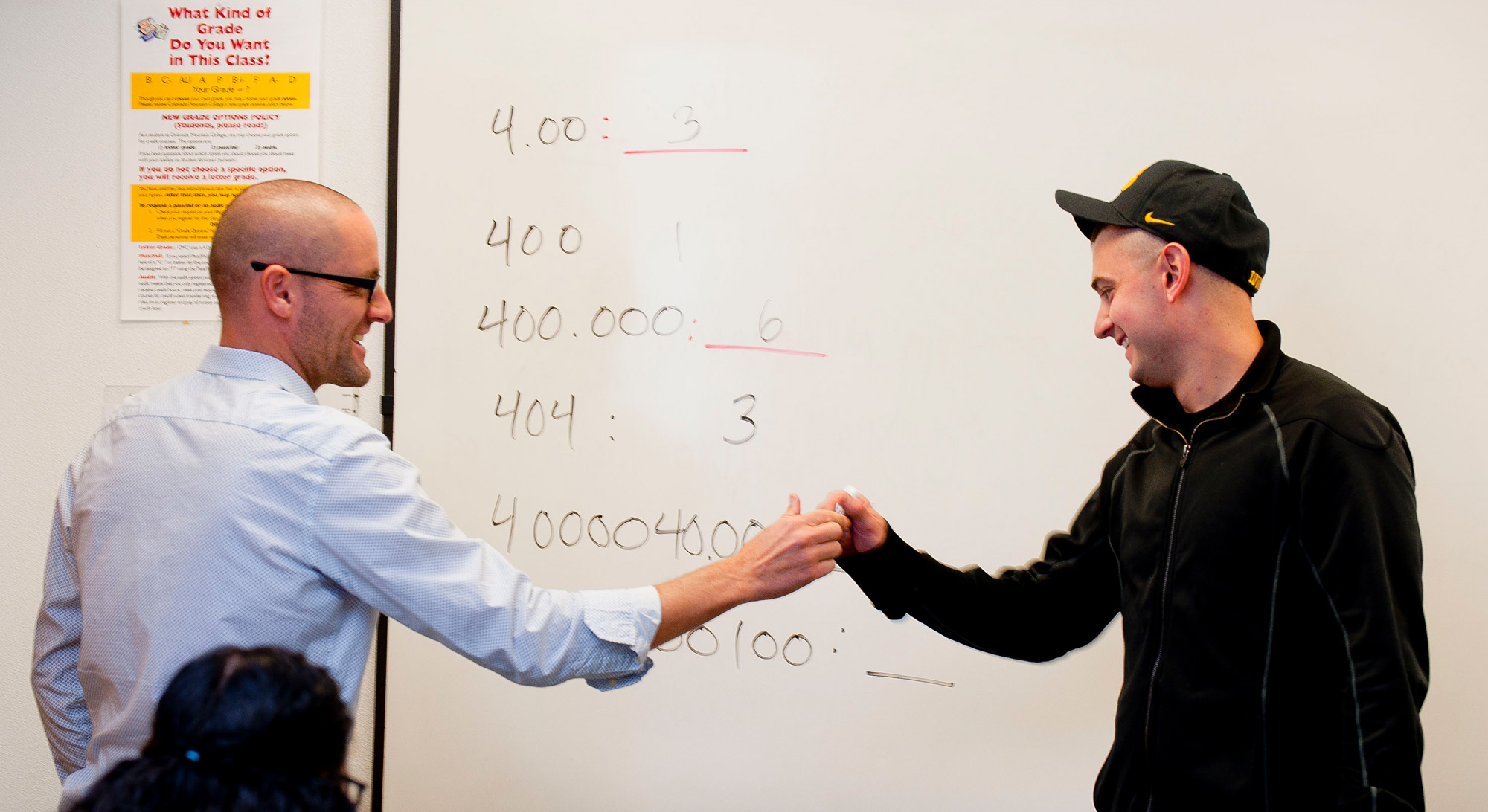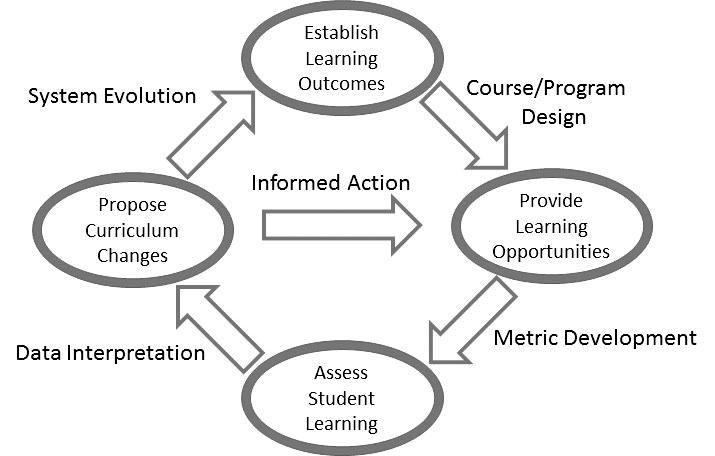
Assessment: Understanding Student Learning at Colorado Mountain College
Student learning is clearly at the heart of Colorado Mountain College’s mission, which states “Colorado Mountain College offers a dynamic and innovative teaching and learning experience serving a diverse population in a student-centered, inclusive, and personalized learning environment.” How we accomplish this mission is multi-faceted, however student success, and therefore student learning, comprises our primary focus.
Student learning is more than just grades. It is a deeper dive into evaluating what our students are able to master in terms of the cognitive (knowing), psychomotor (doing), and affective (expressing) domains throughout all of our academic courses and co-curricular student experiences. This requires an intentional and comprehensive methodology to assess how our students perform against the various outcomes that we wish them to achieve.
This methodology in an academic environment is generally referred to as “Assessment”, and is an institution-wide initiative that encompasses all activities, academic and co-curricular, that involve our students.
Assessment is the right thing to do for our students. We need to understand how our students learn, and be able to modify our teaching methods and our curriculum to ensure that they receive the best instruction we can offer to meet their individual educational goals.
We define our educational quality by how well our students learn, and understand that the public’s expectation for higher education is that we are accountable to ensure that students learn what they need to know to attain personal success and fulfill their public responsibilities in a global and diverse society.
Assessment activities encourage faculty collaboration and sharing of experiences and assessment techniques across disciplines, provide a tangible benchmark of student learning for launching conversations regarding student success, and furnish the motivation to embrace specific institutional changes.
Assessment also allows focusing of scarce resources (both time and funding) toward those initiatives that have the potential for significant improvements in student learning, and to enhance the efficiency of the institution with respect to student success.
Assessment allows institutions like us to tell our story. It provides us a way to validate that what we are doing is important to students, the community, and the state at large; it allows us to show that we are making a difference in students’ lives.
Our accrediting body, the Higher Learning Commission, agrees with this philosophy, stating that “Organizations assess student learning in meaningful, useful, and workable ways to evaluate how they are achieving their commitments, and to act on the results in ways that advance student learning and improve educational quality. Effective assessment of student learning is a matter of commitment, not a matter of compliance.” CMC takes this considerable responsibility seriously.
In its most fundamental form, Assessment is a continuous improvement process, involving four cyclical steps, as diagrammed below.
In everything thing we do, learning goals, generally called Student Learning Outcomes (SLO), must be established that clearly define what we want our students to know or demonstrate when they complete a course, degree, or activity. These outcomes are written to be specific and measurable, so that students are aware of not only their own expectations, but what CMC aspires them to learn.
Once we identify our student learning outcomes, the curriculum or structure of the activity is designed to provide multiple opportunities for our students to practice and refine their learning with respect to these SLOs. As the course or activity progresses, we evaluate how our students are developing against these outcomes (this is the core assessment process).
As a result of this collected information, we can make curriculum changes as necessary (including perhaps refining our outcome statements) to maximize the ability of our students to master the material of importance. This action essentially “closes the loop” of assessment.
At CMC we have defined multiple levels of assessment that we feel are critical in assuring our students receive the best educational program. At the course level, Course Student Learning Outcomes (CSLO) are defined that represent what students should know at the completion of each individual course. Many times, this includes knowledge necessary for continued study at the next level of coursework (prerequisite knowledge).
Program Student Learning Outcomes (PSLO) are at a higher level, and describe what students should know when they complete a certificate or program in a particular academic area, which generally includes a prescribed sequence of courses in a designated field of study (such as Nursing or Sustainability Studies).
General Education Outcomes encompass a wide array of knowledge from multiple diverse courses that embrace a well-rounded background in many areas to prepare our students for effective citizenship and productive employment in a globally competitive and occupationally fluid society.
Finally, Institutional Student Learning Outcomes (ISLO) outline what we expect our students to know when they leave our institution, either by way of degree or transfer that will prepare them for their future educational endeavors and their integration into contemporary civilization.
Learn more about CMC Institutional Student Learning Outcomes.
A General Education program benefits students by encouraging them to acquire the intellectual tools, knowledge, and creative capabilities necessary to be able to study the world as it is, as it has been understood, and as it might become. General Education prepares students for fulfilled lives as educated persons and effective contributors to a democratic society.
To develop a breadth of knowledge, general education courses acquaint students with the methods of inquiry of various academic disciplines and the different ways these disciplines view the world as well as prepare them for employment. Effective general education helps students act ethically and responsibly, and develops habits of critical thinking and action, intellectual sophistication, and an orientation to learning and investigation that will foster lifelong learning.
Our General Education outcomes are a subset of our Institutional outcomes:
- Critical and Creative Thinking
- Communication and Expression
- Information Literacy and Research Ethics
- Recognizing and Supporting Diversity
- Computation and Quantitative Reasoning
While COVID-19 certainly affected the rate of progress made toward our overall assessment program goals this past academic year, several significant accomplishments and milestones were realized. This is a testament to the dedicated faculty and staff who strongly believe in CMC’s vision for continuous student learning improvement. These achievements include:
- Established and convened the faculty-driven Student Learning Assessment Committee (SLAC). Elected faculty leadership, identified SLAC’s primary responsibilities, and developed a multi-year, goal-oriented plan.
- Developed and recorded a series of assessment training videos that cover a wide variety of important assessment topics. Uploaded them to our CMC training website Cornerstone for easy access by all CMC faculty and staff.
- Created a Master Program Outcome workbook to collect and maintain learning outcome revisions for all CMC programs to ensure program outcome consistency between CMC’s website and those approved through Curriculum Committee.
- Integrated assessment processes into Canvas, CMC's Learning Management System (LMS), such that faculty can use Canvas for simultaneous grading and assessment for all three levels of outcomes – course / program / institutional.
- Established a common, college-wide rubric structure for assessment of CMC’s course, program, and institutional outcomes. Embedded this rubric in our Canvas LMS as the default rubric for all assessment activities managed through Canvas.
- Progress ongoing in completing all course learning outcome mappings to our institutional outcomes as well as the state’s Guaranteed Transfer GT Pathways outcomes to support our general education assessment program.
Despite the impact of COVID-19 on our students’ as well as our instructors’ lives, many CMC disciplines successfully adapted their assessment practices to our altered teaching modalities and collected learning data on how our students were achieving CMC’s Institutional Student Learning Outcomes (ISLO).
Below is a chart that compiles our evaluation results from spring, summer and fall semesters for 2020. CMC students are resilient; even under these stressful circumstances our students are achieving the college’s goals for their education to an impressive degree.
CMC ASSESSMENT DATA - Spring/Summer/Fall 2020
| CMC Institutional Student Learning Outcomes | Number of Students Assessed | Number of Students Meeting Outcome | Percent of Students Meeting Outcome |
|---|---|---|---|
| ISLO#1: Critical and Creative Thinking | 1693 | 1616 | 95% |
| ISLO#2: Communication and Expression | 782 | 731 | 93% |
| ISLO#3: Information Literacy and Research Ethics | 360 | 332 | 92% |
| ISLO#4: Responsible Application of Learning | 635 | 602 | 95% |
| ISLO#5: Career, Professional, and Technical Skills | 1021 | 993 | 97% |
| ISLO#6: Recognizing and Supporting Diversity | 482 | 465 | 96% |
| ISLO#7: Collaboration and Teamwork | 644 | 628 | 98% |
| ISLO#8: Computation and Quantitative Reasoning | 127 | 120 | 94% |

